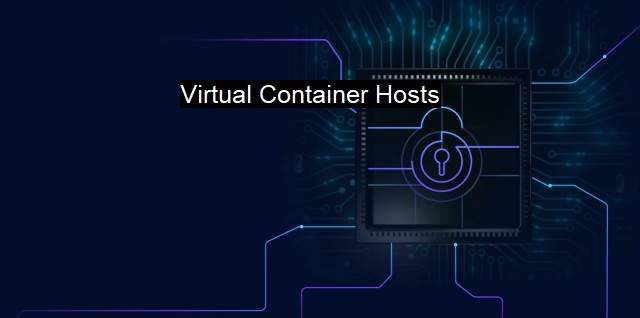What are Virtual Container Hosts?
Protecting Virtualized Environments from Cyber Attacks: Understanding Virtual Container Hosts (VCHs) in Containerization Technology
"Virtual Container Hosts" (VCH) is a term that has gained significant momentum in the cyber world the recent years. While they have become a staple in app deployment tasks among developers, it's advantageous, particularly in the cybersecurity domain and antivirus realm, that deserve a definite mention.The concept of Virtual Container Hosts revolves around providing an isolated environment to run applications or processes. Each virtual container host acts as an autonomous entity functioning within its operating system provided by the host machine while sharing the hardware resources of that parent. The primary advantage of such encapsulation is the tight security it provides against cross-infection, which proves highly beneficial in cybersecurity.
It is essential to understand that the state of cybersecurity is in a continuous flux and the introduction and deployment of new technologies, like virtual container hosts, are challenging both the cybersecurity methodologies and antivirus solutions to evolve and mature.
On the one hand, with the inherent concept of isolation, virtual container hosts create a bulwark against harmful external entities. They ensure that each process or application runs in a secluded environment, limiting its exposure and interaction with others, thus considerably lessening the likelihood of a security breach or cross-contamination. This isolation feature significantly bolsters the strategy of defense in depth as even if a container is compromised; it does not affect others.
A VCH natural trait that assists in cyber resilience is inherent immutability. Containers are meant to be ephemeral, they are built, deployed, used, and then discarded - ensuring a fresh, uncompromised environment each time a container spins up, reducing the window of exposure for any potential threat.
From an antivirus perspective, virtual container hosts provide a new way to apply protective software. Since containers share the OS kernel of the host, the antivirus software deployed on the host potentially provides protection to the containers, saving resources and administrative overhead in the deployment and management of protective software. Modern antivirus solutions have also adapted to scan containers in their building and running phases to identify and exterminate threats without affecting execution time significantly.
Application whitelisting can also be applied more effortlessly in virtual container environments, only permitting approved and verified applications to be executed. This drastically reduces the chances of a malicious program running on the system and propelling malware into the computing environment.
Also, inside the framework of incident response planning, disaster recovery and system backups become simpler and quicker due to the small and portable nature of virtual containers. Security teams can easily phase out affected containers, spin up secure ones, and get the application up and running quickly.
Just as they offer new opportunities, virtual container hosts also present unique challenges in the cybersecurity landscape. The shared kernel model is an avenue that can be exploited by malicious entities, the misconfiguration of container orchestrators can provoke security vulnerabilities, and tracking and attributing container activity can be demanding for cybersecurity researchers.
So as we observe the extensive value that virtual container hosts bring to the cybersecurity landscape, we also see that their effective use needs evolving antivirus solutions, meticulous security protocol, and continuous monitoring and auditing. Regardless of the challenges, the tactical and strategic advantage in maintaining security that container technology provides is undeniable and worthy of its place in a forthright cybersecurity and antivirus toolkit.
As the adoption of this technology multiplies in operation environments, the natural progression is a marked improvement in its security capabilities supported by extensive cybersecurity research. Thus, understanding Virtual Container Hosts' functionalities, managing their array of benefits, and mitigating unique challenges makes them invaluable in the rapidly evolving and escalating war against cyber threats..

Virtual Container Hosts FAQs
What is a virtual container host?
A virtual container host is a technology that allows multiple containers to run on a single physical machine. It provides an isolated environment where each container can operate independently without interfering with each other.How can virtual container hosts improve cybersecurity?
Virtual container hosts can improve cybersecurity by providing an isolated environment, reducing the risk of cyber threats spreading to other applications or systems. Additionally, virtual containers can be created and destroyed quickly, making it easier to maintain security and apply updates.Do virtual container hosts require antivirus software?
Yes, virtual container hosts still require antivirus software to protect against malware and other security threats. Antivirus software can help detect and remove potential threats within the virtual environment.What are the benefits of using virtual container hosts for antivirus software?
Virtual container hosts allow antivirus software to be deployed and managed more efficiently. It enables administrators to isolate the antivirus software in its own container, reducing the risk of false positives and conflicts with other applications. Additionally, virtual container hosts allow for easy scaling, making it easier to accommodate growing antivirus demands.| | A | | | B | | | C | | | D | | | E | | | F | | | G | | | H | | | I | | | J | | | K | | | L | | | M | |
| | N | | | O | | | P | | | Q | | | R | | | S | | | T | | | U | | | V | | | W | | | X | | | Y | | | Z | |
| | 1 | | | 2 | | | 3 | | | 4 | | | 7 | | | 8 | | |||||||